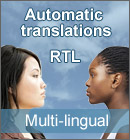Sur les Ecoles at Creches en France (News Viewpoint)
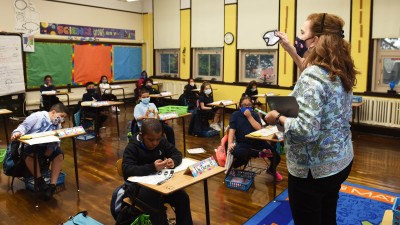
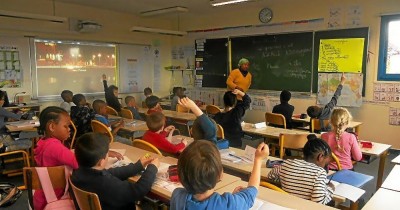
Main Menu
Home Press Deontology/Ethics 2009 Innovation Year EU endorses EuroFora's idea Multi-Lingual FORUM Subscribers/Donors FAQs Advanced search EuroFora supports Seabird newsitems In Brief European Headquarters' MAPs CoE Journalists Protection PlatformBRIEF NEWS
- 00:00 - 02.06.2021
- 00:00 - 18.10.2020
- 00:00 - 19.06.2020
- 00:00 - 18.05.2020
- 00:00 - 20.04.2020
- 00:00 - 02.02.2020
- 00:00 - 09.12.2019
- 00:00 - 27.11.2019
- 00:00 - 16.11.2019
Popular
- Yes, we could have prevented Ferguson riots says World Democracy Forum's Young American NGO to ERFRA
- Spanish People Elect CenterRIGHT Majority with 1st Party and Total of 178 MPs (6 More than the Left)
- Pflimlin's vision
- The European Athletic "Dream Team", after Barcelona 2010 Sport Championship Results
- Source Conseil d'Europe à ERFRA: Debatre Liberté d'Opposants à Loi livrant Mariage+Enfants à Homos ?
- Head of BioEthics InterGroup, MEP Peter Liese : "Embryonic stem cell research reaching its END" !?
- Spain: Jailed Turkish Terror suspect with Explosive,Drones,Chechen accomplices stirs Merah+ Burgas ?
- UN Head Ban Ki Moon at CoE World Democracy Forum : - "Listen to the People !"
Latest News
- EUOmbudsmen Conference 2022: Digital Gaps affect People's Trust threaten EF Project on EU Future ?
- French Election : Black Out on Virus, but Obligation for Fake 'Vaccines" Challenged
- Both French Presidential Candidates point at "Humanism" in crucial times...
- France : Zemmour = Outsider may become Game Changer in Presidential + Parliamentary Elections 2022
- PACE President Cox skips Turkey Worst (Occupation) case compared to Russia (DeMilitarisation) query
Statistics
Visitors: 59022922Archive
Login Form
Other Menu
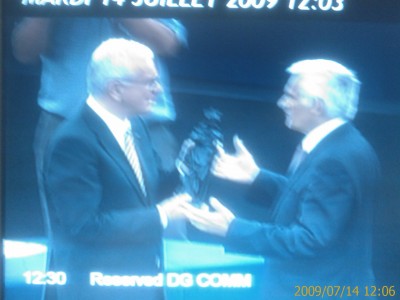
Scientific innovation joined to Faith for Human Rights, Eastern Partnership and fight against the Crisis, but above all, the need to overcome the "Crisis of Trust" from EU Citizens, are the main priorities for new EU Parliament's President, Polish Jerzy Buzek, that a 555-votes-strong majority of MEPs on July 14, Strasbourg made a living symbol of the fact that, 20 years after the fall of Berlin Wall (1989 - 2009) there is no more an Eastern or Western Europe, but only one Europe, as the head of the largest group of MEPs, ChristianDemocrats/EPP, Joseph Daul, stressed after the event.
Speaking later to a group of Strasbourg's Journalists, including "EuroFora", the new EU Parliament's President clarified his stance on concrete topical issues, as f.ex. that of Turkey's controversial EU bid, which was one of the main issues of the June 2009 Electoral campain, clearly won by his party of ChristianDemocrats/EPP : - "At present, Turkey does not fullfil none of EU conditions", he stressed, (See infra).
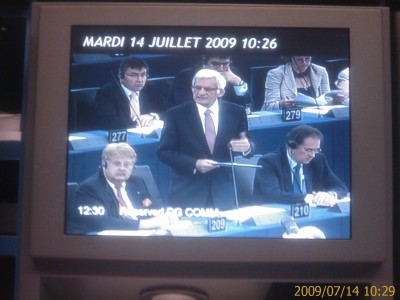
Buzek is well known in Strasbourg and to "EuroFora" as EU Rapporteur for the Framework Program of Scientific Research and Development of Technologies. A Natural Science Professor from the Historic and Religious landmark Polish City of Częstochowa, active in the famous Solidarnosk grass-roots social movement, he served 4 years as Prime Minister (1997-2001), before being elected as MEP in 2004 and 2009, after he brillantly won the latest EU Election at the head of his party (EPP) almost doubling the number of its MEPs from 15 to 28 !
- "Innovation" and "Energy safety", as well as fight against the "Cimat change", but also "Eastern Partnership", the "Mediterranean", "Strategic partnerships" with Russia, the USA, etc, and the search for "solutions to the Economic Crisis" that EU Citizens "expect" from us, will be his "priorities", announced from the outset the new EU Parliament's President, reminding also that the quest for "Human and Civic Rights" played an important role in his experience with the Solidarnosc grass-roots social movement in Poland's History
But, the most important of all, is the urgent need to overcome the "Crisis of Trust" between EU Institutions and the People he stressed : - EU "Citizens often don't understand us", denounced Buzek, launcing a call to "do anything for EU Citizens to understand our work" in EU Parliament : "We (MEPs) need to make EU Citizens involved" in "what we are doing every week, in Strasbourg and Brussels", he proposed. Pointing f.ex. to the hot "Debates" with "strong arguments" exchanged between MEPs during the preparation of their Legislative Decisions, in Committees, delivering often hard struggles between initially opposed points of view, long before forging a majority at the final vote, sometimes more than a year..
Therefore, EU Parliament will be "open to your criticism, for discussion and exchange of views", he promissed to Journalists in Strasbourg.
In this way, Buzek, in fact, highlighted "EuroFora"s main idea, that we strongly advocate since 1997-2007, to systematicaly and actively involve EU Citizens in public debates during the decision-making process of important EU measures, which affect their lives and the society in which they live, (and not only just a few weeks each 4 or 5 Years at the eve of EU Elections)...
--------------------
This is related also to the symbolic gift that Buzek chose to give to the out-going former EU Parliament's President, Hans Gert Poettering, (2007-2009), his collegue in the ChristianDemocrats/EPP, who brillantly won 2009 EU Elections in Germany : A genuine statute of sainte Barbara crafted in Silesia's black Coal by Polish Miners : Those simple but strong people who fought for social change against some technocrats and bureaucrats disguissed into so-called "real-socialists" of old times. (PHOTO).
It's enough to have seen a popular open air mass, at Warsaw's center, with many thousands of people, old and young, simple workers and intellectuals mixed together, with references to Poland's history and struggles for survival and liberty, through various ages, (as fex. that organized at the eve of CoE's 2005 panEuropean Heads of State and Government for the beatification of late Pope John-Paul II), in order to understand what such symbols mean..
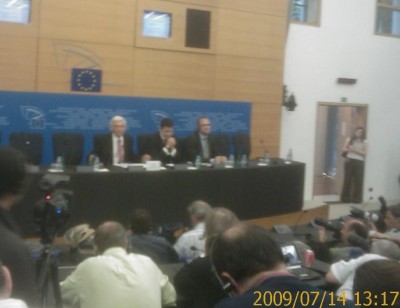
But, overcoming the "Crisis of Trust" with EU Citizens obviously implies also to rectify any errors done in the past, fex. on Turkey's controversial EU bid, with controversial decisions taken in 1999 and 2004 to give a "candidate" status and to start EU negotiations, provoking an unprecedented series of 3 "No" to EuroReferenda and 3 Majoriy Abstentions in EU Parliament Elections : 1999, 2005 and 2009, (even if the latest one succeeded to decelerate and almost stop the drop of participation rates, opening hopes for vote's revival after an electoral campaign clearly critical to Turkey's claims in several mainstream EU countries)
Therefore, Buzek was faced with manifold critical Questions on EU Enlargement, most of them citting concrete examples of certain political problems : But his replies were almost always given as a matter of general principle :
F.ex. Questioned on the suspension of EU - Croatia talks because of a Border conflict with EU Member Slovenia, Buzek prefered to speak about principles :
- "We know that during Enlargement, the process can be blocked by failure to resolve this kind of issues", This concerns also other enlargments' cases", and "these rules are always in force" he warned.
But Buzek avoided to directly reply to a queston on "French and German EPP' calls to define the Borders of Europe", as a German journalist asked him by making a reference to French President Nicolas Sarkozy, and German Chancellor Angie Merkel's, critical statements on Turkey at the June 2009 Electoral campain.
- "Concerning Enlargement, there's always the same rules : There have to be Criteria, which have to be respected if a Country wants to join the EU", he started to simply reply.
- "For my country (Poland) it took us 15 Years to fullfil these Criteria", Buzek reminded, indicating, if proportions are kept, that Turkey, fex. would have to spend some 25 years before eventually joining the EU..
- "Countries wishing to join the EU need to Change their Systems", as we (Poland and other former Eastern European Countries) did, he stressed.
- "'For me, meeting the condition of Human Rights is one of the Key conditions for membership in the EU", preferring again to speak from the point of view of General Principles, on the occasion of an untimely question on Serbia (which is not even a candidate yet)...
- "Turkey" has, "first of all", to fullfil (EU) Copenhagen criteria". Bevause, currently, none of them is fullfiled by Turkey", New EU Parliament's President, denounced, speaking later to a group of Journalists, including "EuroFora".
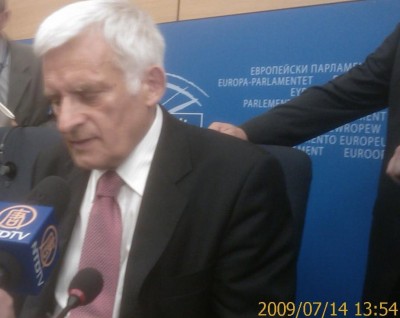
In particular, on Human Rights : - "We (EU) can never forget Human Rights", because "this is at the very Foundations of the EU", Buzek added.
On the contrary, when he referred to EU Enlargment for the "Western Balkans Countries ", Buzek appeared upbeat, finding "promising situations", despite "difficulties" in the Past, since "Countries are queuing to become EU members", and this "generated changes", as he said.
As for Russia, Buzek observed that it was a "very important" country, located "in the same Continent", Europe, "close to our borders", and "we need eachother". "But Russia' has 'differend poblems : "They claim that their system is Democratic, but rules are differend", and we must be "aware of such differencies", fex. "on Human Rights", that we can't ignore, as he said;
Concerning China, where a journalist observed that the recipient of EU Parliament's latest "Sakharov prize" for freedom of thought is "still in prison", Buzek found that since the 1999 events in Tien Amin square, "we see differencies on Human Rights still today", and expressed his "support" for those who try to ameliorate the situation.
On the contrary, speaking recently to "EuroFora" he strongly supported the idea for an EU - Ukraine cooperation, fex. between Airbus and Antonov, in order to build a less costly but more performant than the old and problematic A400M, new Military Transport Airplane : - "They (Ukranian Antonov Company) can certainly do it. I'm sure they can. It's a good Idea, and I'd be glad if it was done", he told us. (See : http://www.eurofora.net/newsflashes/news/airbusantonov.html )














